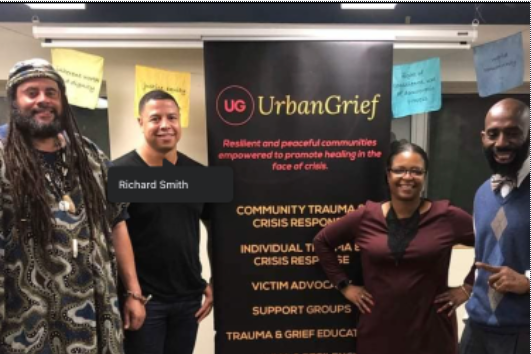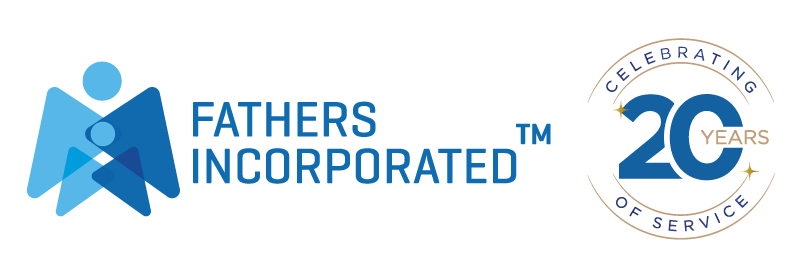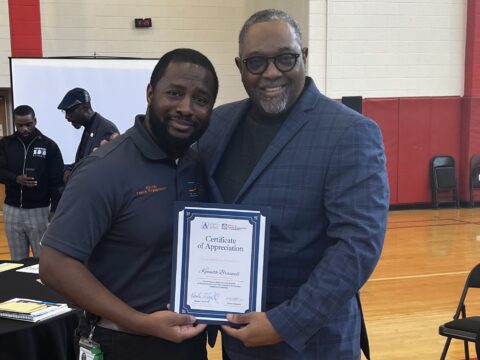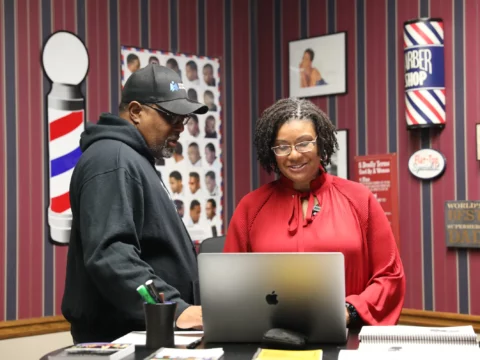Navigating the Emotional Terrain for Dads

In the kaleidoscope of human experience, the hues of grief and trauma often cast the longest shadows, yet amid these shades, there are individuals whose journeys inspire and transform. Lisa Good is one such figure, whose story resonates with the power of resilience, the depth of faith, and the transformative impact of healing.

The tapestry of Lisa’s life is interwoven with threads of profound loss and remarkable strength. Her narrative is not singular but a chorus of many voices that speak to the universal experience of grief. This story, inspired by an I Am Podcast interview, is a testament to her journey and her work with Urban Grief, a beacon of hope for those traversing the desolate terrains of sorrow.
Lisa’s understanding of loss is not merely academic; it is etched in the fabric of her being, a wisdom gained through personal encounters with bereavement. The foundation of her insight into grief was laid early on, as she was blessed with the presence of two father figures in her life—a testament to the rich, complex tapestry of family dynamics that shape us. Her biological father and stepfather, neither threatened by the other’s influence, offered her a dual inheritance of love and care, each distinct in their contributions to her upbringing.
The sudden loss of her stepfather in 1989 was a seismic event in Lisa’s world, an experience that underscored the indiscriminate nature of grief. It was a loss that reverberated through the years, echoing the delicate balance between presence and absence, between the love received and the void that remains. Yet, in the midst of this profound loss, Lisa’s biological father remained a constant, his own way of showing love through acts of service—a carpenter and a cook, leaving indelible marks of his affection in the very structure of Lisa’s home and life.
“Every September,” Lisa recalls, “was our time together—that’s the daddy do-list. Anything around my house that needed fixing, he was there.” The windows covered, the plumbing fixed, each task a chapter in their shared story, a testament to a father’s love that transcends the conventional narrative. It was this foundational relationship that informed Lisa’s compassionate understanding of loss and her commitment to honoring every connection, every memory.
From these personal chapters emerged Lisa’s professional calling. Lisa’s vocation as a transformative figure in addressing trauma, grief, and loss is not merely a career—it is a calling forged in the crucible of her own experiences. She began her academic journey at Skidmore College, continuing to earn her master’s degree in social work from the State University of New York at Albany. With over two decades of experience in addiction services and a host of roles from HIV educator to community activist, Lisa has become a testament to the power of dedicated service.
Her vision for Urban Grief was birthed from a divine whisper, an urging from God during a time when her community faced the anguish of young lives lost to violence. “Do something,” the voice prompted, and Lisa listened. She transformed her pain into purpose, her mourning into movement. This initiative was not about academic theory; it was about touching lives, about being present in the aftermath when the crowd disperses and the real grieving begins.
Lisa speaks of grief with the clarity of someone who has walked its paths and navigated its valleys. “Grief is a normal emotional response to any significant change or loss,” she explains. It’s a definition she expands to encompass not just the deaths that punctuate our lives but the myriad changes that accompany our journey. Her work with Urban Grief is a testament to this understanding, serving those who struggle to find footing in the shifting sands of loss.

Kenneth Braswell, while not the focus of Lisa’s story, offers poignant reflections that amplify the themes of Lisa’s work. “We often are always talking about where do we fall in the space of us helping everybody else? When do we take time to help ourselves?” Kenneth posits, underscoring the importance of self-care in the toil of service. His perspective echoes through Lisa’s narrative, a reminder that those who bear the torch of helping others must also tend to their own flames.
Lisa’s work is an intricate dance with trauma, which, as she states, “produces grief because you rarely experience traumatic events without a concomitant sense of loss.” Her insights delve into the nature of trauma and grief, their interplay and individual characteristics. It’s a distinction she makes with the precision of a scholar and the empathy of a healer. Her expertise is a lighthouse for those sailing the stormy seas of bereavement.
Yet, Lisa’s story is not solely about understanding grief—it’s about transcending it. Her faith is the bedrock upon which her work stands, an unwavering belief in the power of the divine to comfort and to guide. “It’s never too late to grieve,” she professes, a declaration of hope for those who think the window for their mourning has passed.
The narrative of Lisa’s life and work unfolds as an invitation to anyone who carries the weight of unshed tears or unspoken yearnings for those they’ve lost. She stands as a guardian at the gates of grief, assuring us that it is not a realm where we must wander alone. Through her work with Urban Grief, Lisa has created a sanctuary where the bereaved can find solace, validation, and a way forward.
Kenneth Braswell’s thoughtful inquiries during the interview offer a frame for the depth of Lisa’s expertise. He asks, “When something happens or you’re watching something, which is why I don’t watch the news, because the news triggers me… How does my work help remedy what I’m seeing on TV?” This question not only addresses the personal impact of trauma but also sparks a broader conversation about the communal aspect of grief and the ripple effects it has across society.
Lisa’s response to such questions is both profound and pragmatic. She understands that grief is not an island but a peninsula, always connected to the mainland of our collective experience. Her approach is not to isolate grief but to integrate it into the broader context of our lives, acknowledging its power and presence.
Urban Grief is more than an initiative; it’s a movement that recognizes the compounded layers of loss that people, particularly within the Black community, face. Lisa illuminates the disparities in experiences of grief, citing that “the average Black child experiences their first significant loss by age eight.” This startling fact underlines the urgent need for the work Lisa is committed to—a need that extends beyond the individual to the heart of the community.
Her message resonates with an undeniable truth: grief is not just about the deaths we mourn but about the lives we celebrate and the legacies we carry forward. Lisa’s own story of her father and stepfather exemplifies this as she continues to honor them through her passion and her mission.
Lisa’s faith is not just a backdrop to her story; it is the very stage upon which it unfolds. It is her unwavering faith that has enabled her to face the torrents of grief and emerge not just unscathed, but empowered. Her worship, she shares, is “ugly, unorthodox, uncomfortable,” but it is authentic. It is this authenticity that she brings to her work, allowing for genuine healing to take place.
“Be of good courage,” she says, echoing the biblical words that have fortified her through her trials. It’s a courage that she imparts to those she guides through the valley of shadows. Lisa’s vision of grief recovery is not one of silent suffering but of vocal victory, where each cry and each tear is acknowledged as part of the journey to healing.
In closing, Lisa’s story is a testament to the resilience of the human spirit, the power of faith, and the importance of acknowledging and addressing grief. Her life’s work with Urban Grief stands as a testament to the transformative power of turning personal tragedy into communal hope. Her message to anyone grappling with loss is clear: “It will transform your life… you don’t have to do it alone.”
This article merely scratches the surface of the wisdom Lisa Good offers. For those looking to hear more about her life, her insights, and her transformative work, the I Am Dad podcast provides a platform for deeper exploration. You can listen to the full interview and many others that provide comfort and guidance by visiting www.iamdadpodcast.com or by finding I Am Dad on all major podcast platforms.
In a world that often shies away from the topics of grief and trauma, Lisa Good stands as a beacon of hope, reminding us that even in our darkest moments, we are never beyond the reach of grace, healing, and renewal.



